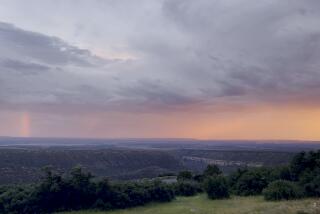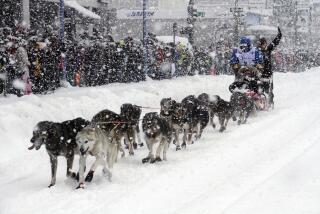No City Slicker : Susan Butcher, Four-Time Iditarod Champion, Lives Hundreds of Miles From Civilization in Alaska, and She Wouldn’t Have It Any Other Way
- Share via
Susan Butcher wanted no part of places like Los Angeles, and that was before the riots.
Butcher, a four-time Iditarod champion, just doesn’t care for big cities. Some must wonder if the dog musher from Alaska doesn’t like people.
Butcher, after all, packed her bags 19 years ago and moved from Colorado into the heart of the Alaskan wilderness. Her closest neighbor was 40 miles away; the closest road, 50 miles away.
Winters were cold and harsh, with temperatures to 70 below and winds to 100 m.p.h.
Butcher was only 18. She didn’t mind the weather or that there was no television, no telephone service.
“What I found was that I was very content to be there and to be on my own,” she said, matter-of-factly.
Susan Butcher, 37, came to Los Angeles just last week as a special guest of the America’s Family Pet Show in Pomona. It was her first time out of Alaska since last August.
She left the area only days before outrage turned to fury, which turned much of the city to ruins.
Butcher, who has since returned to “the bush,” would have something to say about this. Animals would never act the way the people acted here last week, she might offer. Not with such vicious intent, anyway.
Butcher loves animals. She has a way with them, as anyone who knows her will attest. She has 120 dogs and treats them better than many people treat their own kin. Certainly better than some have treated their own kind this past week.
Try telling her that mushers are villains who push their dogs beyond tolerable limits. She’ll tell you you’ve been reading too many Jack London stories. Butcher, in her treatment of dogs along the trail, even won the approval of the Humane Society.
“All of my dogs are complete pets,” Butcher said. “They go swimming with me, they go biking with me, they all come in the house. They are just a lot of big pets, along with the fact that they are working dogs.”
Last week Butcher, who has been married for six years, spoke of her desire to raise a family.
It seems she already has one.
“It isn’t just that you name them all,” she said of her dogs. “I mean I know every single thing about these dogs. I know their parents, grandparents and their great-grand parents.
“I know every childhood disease they’ve had. I know everything about every dog. I can tell a dog running past me on dark night so that I can’t see color or anything else, but just barely see its shape, but I can see the way it moves and I can tell you what dog it is. I can hear a bark; I can hear one dog bark out of 120 with my back turned to them and I can tell you which dog is barking. I mean I know everything about these dogs.”
Actually, Susan Butcher has nothing against people. It’s just that she seems to understand animals better.
“All I talked about when I was a kid was wilderness and animals,” she recalled. “I didn’t know I wanted to mush dogs. I thought I wanted to farm or something; but I knew I wanted to be living in log cabin off in the wilderness. I didn’t know Eureka (Alaska). I didn’t even know Alaska. I had dreams of northern Canada.”
Butcher wound up in Eureka, 300 miles north of Anchorage, just south of the Yukon River. Population, six. Electricity, none. Running water, none.
Her family and friends were left behind, thinking Susan Butcher would get over this “stage” of life and return.
Rather, she remained in the wilderness, where the looters have long-since passed on, having blazed their trails through the area 100 years or so ago, seeking the most alluring loot of all: gold.
Jack London, in his Two Tales of the Klondike, wrote of the Gold Rush period: “Today, a man may wander away from the trail for 100 days, and just as he is congratulating himself that he is at last treading virgin soil, he will come upon some ancient and dilapidated cabin, and forget his disappointment in wonder at the man who reared the logs.”
Susan Butcher found such a cabin, in 1973, in the Wrangell Mountains near the Canadian border. And, for her, wonders never ceased.
“It was Utopia for me,” she recalled. “Around every single bend that you turned, there was either moose or caribou or doll sheep, or mountain goat or wolf or wolverine, or fox or lynx, mink, beaver . . . anything you can think of. Any corner you would turn you would see something.”
But Butcher eventually found this area too remote. Her only income came from the occasional building of a log cabin, and, in the spring, from part-time work at a musk-ox farm in Fairbanks.
It was of this area that London also wrote, again of the gold seekers: “They forgot the world and its ways, as the world had forgotten them.”
Butcher was no gold seeker. She was a musher, intent on competing in the Iditarod.
“It isn’t simply going off and living in the wilderness and forgetting the world,” she said.
No, Butcher had been reading about the grueling 1,158-mile Anchorage-to-Nome race since it was first run in 1973.
“I said, ‘That’s what I want to do and that’s where I’m going,’ and so I packed my bags and moved to Alaska,” she recalled.
She began with $600. She blew $200 of it on four dogs, “and I went out and lived for that winter where my closest neighbor was 40 miles away,” she said. “I just lived out there in the bush and basically taught myself how to mush for real and how to survive in the wilderness and what to do.”
The years passed and Butcher had 16 dogs. She decided that transporting them from the Wrangell Mountains on a regular basis would be logistically impossible, so she searched for a new cabin. She found in Eureka an abandoned blacksmith shop, built during the Gold Rush and somewhat accessible during the summer months via a gravel road. “I fixed it up, and it is still where I live 13 years later,” she said.
Butcher raced in her first Iditarod in 1978, with a team of what she called “back-yard dogs.”
She finished in the money and found herself well on her way toward earning respect of a hardy bunch of men who thought she coddled her animals too much to make it in the sport they had always expected to dominate.
Now she dominates the race, needing one more victory to match the five by fellow musher Rick Swenson. She finished in the top 10 on her second try in 1979 and has been in the top five ever since, with the exception of 1985, when her team of dogs was attacked by an angry moose.
Butcher could have won the race. She was leading, alone in the twilight of the Alaskan night, mushing through a thickly wooded, twisting trail, when she rounded a corner and noticed the animal, a stately silhouette that soon turned to life in the form of raging fury.
“She ran into the team, kicking and stomping and, within probably eight seconds, she had killed two dogs and injured 13 others,” Butcher said. “I held her off with an ax for about 20 minutes, and then another musher came along and then I shot her.”
Butcher managed to get the injured dogs back to a nearby veterinary clinic, where she lived for the next two weeks until the last one was well enough to leave.
She labeled the incident a “freak accident.”
“We are out in the wilderness, out there challenging ourselves,” she said. “There is no doubt that living out in Alaska itself is a certain amount of a challenge. However, in all of my 22 years of mushing, I’ve only lost two dogs and it was both in the same incident. It’s not that dangerous.”
Compared to the city, anyway.
More to Read
Sign up for Essential California
The most important California stories and recommendations in your inbox every morning.
You may occasionally receive promotional content from the Los Angeles Times.













